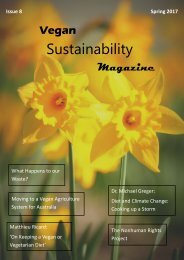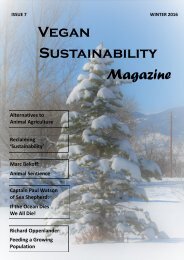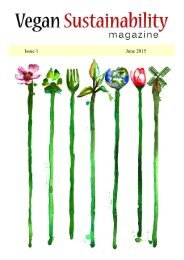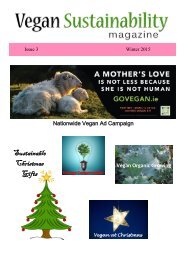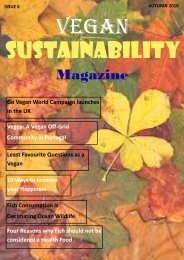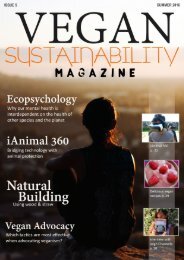Vegan Sustainability Magazine - Autumn 2015
A free, online, quarterly magazine for vegans and non-vegans worldwide who are interested in the environment and sustainability.
A free, online, quarterly magazine for vegans and non-vegans worldwide who are interested in the environment and sustainability.
Create successful ePaper yourself
Turn your PDF publications into a flip-book with our unique Google optimized e-Paper software.
Documentary Review<br />
But in the mid 1970’s Ladakh had a sudden<br />
and rude awakening to the modern world as trucks<br />
rolled in bringing cheap foreign imports of food<br />
and other goods, exposing the people to Westernstyle<br />
advertising and consumer culture. After a period<br />
of about ten years their way of life had completely<br />
changed and for the first time they experithe<br />
Economics of Happiness<br />
This is a documentary which was written, produced<br />
and directed in 2011 by Helena Norberg-<br />
Hodge, founder of ‘Local Futures’ and author of<br />
the widely-acclaimed book ‘Ancient Futures: Lessons<br />
from Ladakh for a Globalising World’. The<br />
book is an account of her time spent with the people<br />
of Ladakh in the Himalayas, and it is an experience<br />
which forms the basis of the documentary.<br />
Until recent times Ladakh was a small community,<br />
isolated from the modern world. The people<br />
sustained themselves through farming and regional<br />
enced unemployment, depressive illnesses, a disconnection<br />
from nature, pollution and a gap between<br />
rich and poor.<br />
The documentary is made up of two parts. The<br />
first half of the documentary looks at the ways in<br />
which globalisation is detrimental to communities,<br />
the environment and livelihoods. The second half<br />
looks at how localisation can enhance people’s<br />
lives, regenerate communities, heal the planet and<br />
generally make us happy.<br />
The following statements are made regarding<br />
globalisation:<br />
trade. They were a close-knit community and<br />
seemed happy and fulfilled, with lots of leisure<br />
time, plentiful food and a strong sense of their own<br />
identity.<br />
Globalisation makes us unhappy - There is a rise<br />
in the incidences of depression as a result of<br />
globalisation. We are constantly exposed to<br />
images of a lifestyle that we must measure up<br />
to, and affluence tends to undermine community<br />
which can leave people feeling isolated.<br />
Globalisation breeds insecurity – Corporations are<br />
dictating what our children want to buy and<br />
what they should care about. People in a global<br />
economy lose their own cultural identity starting<br />
from childhood.<br />
Globalisation wastes natural resources – Natural<br />
resources are already stretched to breaking<br />
point yet we are encouraged to buy more and<br />
more.<br />
Globalisation accelerates climate change – Food is<br />
flown from one part of the world to another just<br />
to be processed, then sent back again. Countries<br />
routinely import and export identical quantities<br />
of the same products. For example, the<br />
U.S. imports 365,350 tons of potatoes and exports<br />
324,544 tons of potatoes each year.<br />
70,820 tons of sugar are imported and 83,083<br />
tons are exported. Argentinian lemons fill the<br />
shelves of supermarkets in Spain while local<br />
lemons rot in the ground. Half of Europe’s<br />
peas are grown in Kenya. The list is endless,<br />
not to mention bizarre. (See graphic on the<br />
next page).<br />
Globalisation destroys livelihoods – Jobs are major<br />
casualties of globalisation.<br />
Globalisation increases conflicts – Small farmers<br />
are pushed off the land. There is increased<br />
competition for jobs and ethnic and other tensions<br />
rise.<br />
Globalisation is built on handouts to big business -<br />
Government subsidies and rescue packages sup-<br />
30



